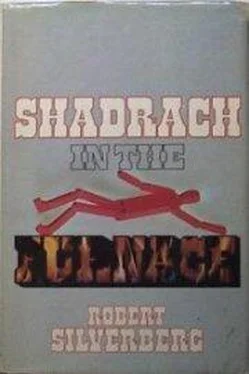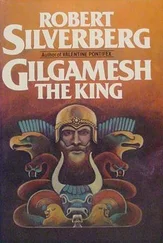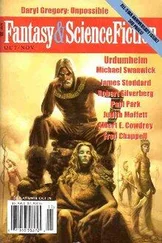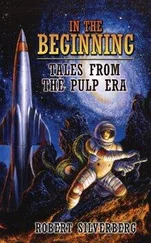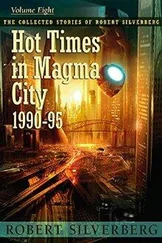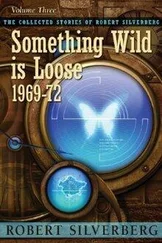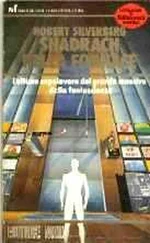What this means, at the moment, is that Genghis Mao probably has been having bad headaches for a few days, that he will have worse ones if Shadrach Mordecai does not return to Ulan Bator at once, and that he may suffer brain damage — possibly fatal — if prompt corrective action is not taken. It means, also, that Shadrach’s holiday is at its end. He will not do the sightseeing tour of Peking. Not for him the visit to the Forbidden City, the historical museum, the Ming tombs, the Great Wall, the temple of Confucius, the Working People’s Palace of Culture. Those things are unimportant to him now: this is the moment for which he was waiting during his wanderings from continent to continent. The unstable system that is Genghis II Mao IV Khan has, in the absence of the devoted physician, begun to break down. Shadrach’s indispensability has been made manifest. He is needed. He must go to his patient immediately. He must take the appropriate actions. He has his Hippocratic obligations to fulfill. He has his own survival to think about, besides.
Shadrach descends to the hotel lobby to arrange for a seat aboard the next flight to Ulan Bator — there is one that evening, he learns, leaving in two and a half hours — and to check out of the room he so recently checked into. The clerk, a gaunt young Chinese who is unable to contain his fascination with the color of Shadrach’s skin, staring and staring with surreptitious sideways glances, comments on the brevity of his stay in Peking.
“Change of plan,” Shadrach declares resonantly. “Urgent business. Must return at once.”
He glances down the length of the lobby — a dim, fragrant space, like the vestibule of some enormous Chinese restaurant, cluttered with mahogany screens and porcelain urns and huge lacquer bowls on rosewood pedestals — and sees, towering above a pair of porters, the husky, hulking figure of Avogadro. Their eyes meet and Avogadro smiles, nods bis head in salute, waves a hand. He has just arrived at the hotel, it seems. Shadrach is not at all surprised to discover the security chief here. It was inevitable, he decides, that Avogadro would show up to make the arrest in person.
Neither of them remarks on the coincidence of their presence in this exotic place. Avogadro asks amiably, “How have you been enjoying your travels, Doctor?”
“I’ve seen a great deal of the world. Most interesting.”
“That’s the best word you can choose? Interesting? Not overwhelming, illuminating, transcendental?”
“Interesting,” Shadrach repeats deliberately. “A very interesting trip. And how is Genghis Mao bearing up in my absence?”
“Not too badly.”
“He’s well looked after. He likes to think I’m indispensable, but the relief staff is quite capable of handling most of what’s likely to come up.”
“Probably so.”
“But he’s been having headaches, hasn’t he?”
Avogadro looks mildly startled. “You know that, do you?”
“I’m just at the edge of the telemetering range here.”
“And you can detect his headaches?”
“I can pick up certain causal factors,” Shadrach says, “and deduce a headache from them.”
“How clever that system is. You and the Khan are practically one person, wouldn’t that be so? Connected the way you are. He aches and you feel it.”
“Well put,” Shadrach says. “Actually, Nikki was the first one to make that point to me. Genghis Mao and I are one person, yes, one united information-processing unit. Comparable to the sculptor and the marble and the chisel.”
The analogy does not appear to register with Avogadro. He continues to smile the fixed, determinedly affable smile that he has been smiling since they first approached one another in the lobby.
“But not united closely enough,” Shadrach goes on. “The system could be linked even more tightly. I plan to talk to the engineers about building some modifications into it, when I get back to Ulan Bator.”
“Which will be when?”
“Tonight,” Shadrach tells him. “I’m booked on the next flight out.”
Avogadro’s eyebrows rise. “You are? How convenient Saves me the trouble of—”
“Asking me to return?”
“Yes.”
“I thought you might have had something like that in mind.”
“The truth is that Genghis Mao misses you. He sent me down here to talk to you.”
“Of course.”
“To ask you to come back.”
“He sent you to ask me that. Not to bring me, but to ask me. If I would return. Of my own free will.”
“To ask, yes.”
Shadrach thinks of the Citpols keeping tabs on him all around the world, huddling, conferring, passing bulletins on to their colleagues in distant cities. He knows, and he is sure that Avogadro knows that he knows, that the real situation is not as casual as Avogadro would have him believe. By buying that ticket on this evening’s flight, he has spared Avogadro the embarrassment of having to take him into custody and return him to Ulan Bator under duress. He hopes Avogadro is properly grateful for that.
He says, “How bad are the Khan’s headaches?”
“Pretty bad, I’m told.”
“You haven’t seen him?”
Avogadro shakes his head. “Only on the telephone. He looked drawn. Tired.”
“How long ago was this?” “The night before last. But there’s been talk in the tower all week about the Chairman’s headaches.”
“I see,” Shadrach says. “I thought it might be like that. That’s why I’ve decided to go back ahead of schedule.” His eyes rest squarely on Avogadro’s. “You understand that, don’t you? That I bought my return ticket as soon as I realized the Khan was in discomfort? Because it was my responsibility to my patient. My responsibility to my patient is always the controlling factor in my actions. Always. Always. You’re aware of that, aren’t you?”
“Naturally,” Avogadro says.
June 23, 2012
What if I had died before my work was done? Not an idle question at all. I am important to history. I am one of the great reconstituters of society. Subtract me from the scene in 1995, in 1998, even as late as 2001, and everything tumbles into chaos. I am to this society as Augustus was to the Roman world, as Ch’in Shih Huang Ti was to China. What kind of world would exist today if I had perished ten years ago? A thousand warring principalities, no doubt, each with its own pathetic army, its own legislature, currency, passports, border guards, customs levies. A host of petty aristocracies, feudal overlords, secret cabals of malcontents, constant little revolutions — chaos, chaos, chaos. New outbreaks of virus warfare, very likely. And ultimately the extinction of mankind. All this if you subtract Genghis Mao at the critical moment in history. I am the world-savior.
It sounds obscenely boastful. World-savior! Culture-hero, myth-figure, I, Hrishna, I, Quetzalcoatl, I, Arthur, I, Genghis Mao. And yet it is true, truer for me than for any of them, for without me all of mankind might be dead today, and that is new in the history of the savior-myth. To end the strife, to seal away the virus, to sponsor Roncevic’s work — yes, no doubt of it, this could have been a dead planet by now if I had gone into the tomb ten years ago. As history will recognize. And yet, and yet, what does it matter? I will not be forgotten when I die — I will never be forgotten — but I will die. Sooner, later, my subterfuges will exhaust themselves. Neither Talos nor Phoenix nor Avatar can sustain me indefinitely. Something will fail, or boredom will conquer me and I will terminate my own systems, and I will die, and then what will it have meant to have saved the world? What I have done is ultimately meaningless to me. The power I have attained is ultimately empty. Not immediately empty — here I sit, do I not, among splendor and comfort? — but ultimately empty. I pretend that there is meaning in empire, but there is none, no meaning anywhere. This is a philosophy common among the very young, and, I suppose, among the very old. I must pretend that power is important to me. I must pretend that the reckoning of history is the all-consoling consolation. But I am too old to care. I have forgotten why it mattered to me to do what I have done. I am playing out a foolish game, unwilling to let it reach its end, but unsure of the nature of the winning gambit. And so I go on and on and on. I, Genghis II Mao IV Khan, savior of the world, taking care to conceal from those around me the profound and paralyzing vacancy that lies beneath the subcellars of my spirit. I think I have lost the thread of my own argument. I am tired. I am bored. My head hurts. My head hurts.
Читать дальше
